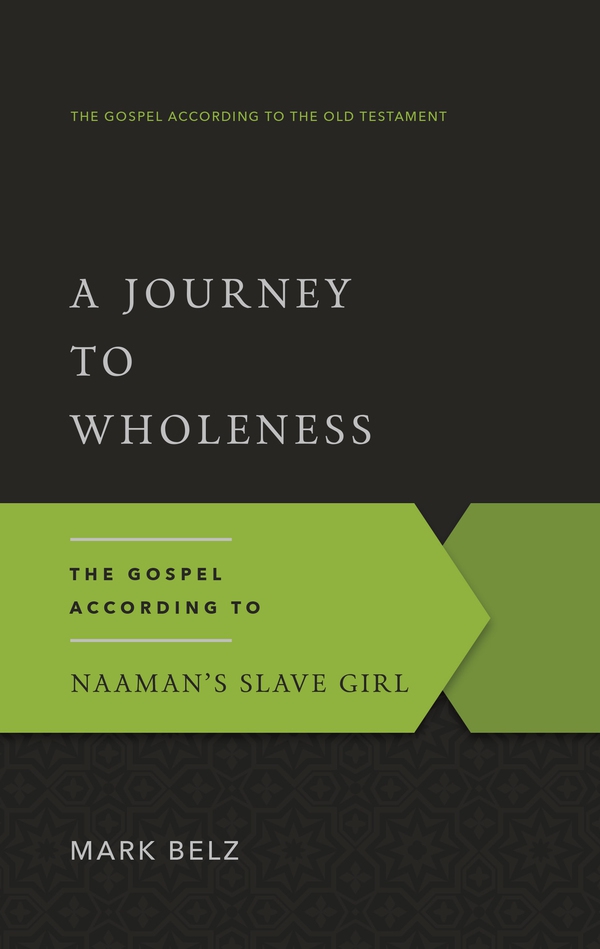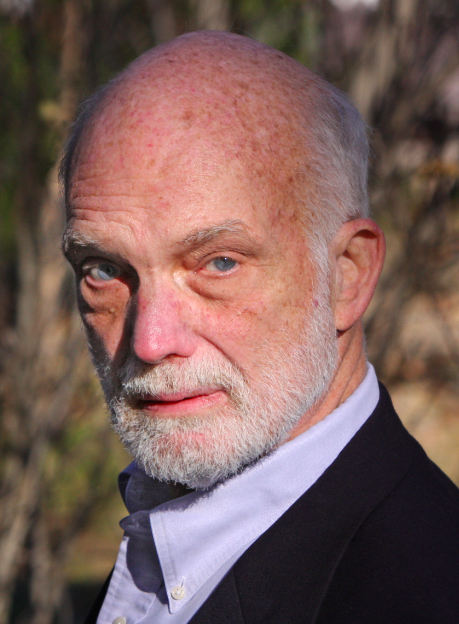This week’s author interview is with Mark Belz. He is the author of A Journey to Wholeness: The Gospel According to Naaman’s Slave Girl, the newest book in the Gospel According to the Old Testament series.
- Question #1 – Tell us a little bit about yourself: where you’re from, family, job, personal interests, unique hobbies, what you do in your spare time, etc.
I grew up in a large family—eight children—in Iowa. Dad was the pastor of a rural church there, and in 1951 started a small Christian school, where all of us kids received our education. My wife and I were married in 1965 after graduating from Covenant College. We have two grown children and four grands, the joy of our life. I attended law school in Iowa, and practiced there for five years before moving to St Louis to attend Covenant Seminary, where I received the M.Div. degree in 1981. Since then, through 2008, I practiced law.
- Question #2 – When did you first want to write a book?
I never thought of myself as a writer, but first was inspired to write during the tumultuous days of the early eighties, when many Christians were illegally blocking the entrances to abortion clinics, particularly here in St Louis. Students from Covenant Seminary and many Roman Catholic brothers and sisters engaged in this, and our law firm was called upon to represent them, which was a challenge and a joy at the same time. Out of this, I felt the protesters needed a ‘defense’ in the church, and I wrote Suffer the Little Children: Christians, Abortion and Civil Disobedience. That was my first interest, and I do not believe I could author anything without being personally inspired to do so.
- Question #3 – Which writers inspire you?
I loved Lord of the Flies (William Golding) when I first read it in 1961. I still am inspired by his style, and his power. No author has inspired me more. I was not a diligent reader during my years of law practice, but since about 2000 I have read consistently. I read Gulag Archipelago (Aleksandr Solzhenitsyn), Rise and Fall of the Third Reich (W.L. Shirer), and Lincoln: A Life (Michael Burlingame). These three works are lengthy, and make for tedious reading, but there is more than adequate reward. I was amazed at the ability of the authors to go into such detail and use the facts to discover and articulate great moral values.
- Question #4 – Have you always enjoyed writing?
I enjoy it when I get into it. I have to be inspired, though. When I have taught Bible study classes, I get a bit carried away with the Scripture that we are studying, and then develop a desire to write. In writing the book A Journey to Wholeness: The Gospel According to Naaman’s Slave Girl, so many facets of what it means to be eternally reconciled to God and his family kept coming clear to me, and I thought about little else until the book was done. Then there is that time after it’s submitted, and I think about what I should have said, or how I could have said it differently. Seems like it never ends. I’m working on a book on Job right now, and it sort of takes over my brain.
- Question #5 – What inspired you to write this book, about this topic?
I have never been a good evangelist—that is, I’ve always felt that I failed in the area of personal evangelism. I think I have made the whole effort too complex. When I read 2 Kings 5, I was taken with this little girl, a slave, who gave a very simple, joyful, enthusiastic testimony. All she did was to tell Naaman, a Syrian general, where he could be healed. God honored that little girl’s testimony in an amazing way, by healing Naaman physically and bringing him into the family of God. This is what inspired me. You don’t need a law degree, or a seminary degree, or a complex argument to present the Gospel. It’s simple and profound at the same time.
- Question #6 – Do you have a specific spot where you enjoy writing most?
Yes. The deck, especially in a St. Louis autumn. Wow. Anyone could write in that environment.
- Question #7 – What book are you reading now?
Calvin’s sermons on Job. He preached 159 sermons on the Book of Job, and this will take some time. I am learning a whole lot from this brilliant theologian, and have even found some areas where I don’t agree with him. He’s most likely right.
- Question #8 – Other than the Bible, do you have a favorite book?
I haven’t enjoyed any book more than Here I Stand (Roland Bainton), an energizing work regarding the life of Martin Luther. I first read it in 1975, and have gone back to it many times.
- Question #9 – Do you have a favorite author? Who is it and why?
This depends on the area of subject matter. In the realm of theology, my favorite is John Murray, and in particular, his commentary on Romans. He is able to articulate the heart of the Gospel in a warm and winsome way, yet with unrivaled theological precision. I think he brings those two things together, as they should be. But my favorite author, to date, is David McCullough, a historian and biographer. His biography of John Adams is captivating, objective, and instructive. He has mastered the English language, and like John Murray, melds the emotion and inspiration of the book with a scholarly study of the facts.
- Question #10 – Do you have a favorite movie? What is it and why?
I suppose it’s passé, but my all-time favorite is “Lawrence of Arabia”, starring Peter O’Toole. The pairing of English discipline with wild tribalism, as executed in the movie, is masterful. The acting is flawless, it seems to me. And the story, as best I can tell, is pretty close to accurate history.
- Question #11 – Do you have a favorite quote? What is it and why?
One of my favorite quotes is from the Angel of the Lord in Joshua 5:14. Joshua saw him in the path ahead of him, and asked if he was “for us” or “for our enemies.” The quote is the answer that Joshua got: “Neither, but as commander of the army of the LORD I have now come.” I love this because every day, particularly in prayer, I veer off into wondering if the Lord is on my side or not. This quote is the antidote for that confusion. The Lord doesn’t side with me in all my earthly desires, but comes as commander. I need this to permeate my thinking and priorities.
- Question #12 – What advice would you give to aspiring writers?
I would encourage any person who embarks on writing a book to first consider whether he or she wants to write because they are exercised to write about a particular topic, or if they just want to write. I’m not that experienced myself, but I believe good writing comes from enthusiasm about the topic. I’m not sure that doing so just to develop talent, and maybe a reputation as a good writer is enough to sustain the effort. So if there is a topic, person, or event that is smoldering in your brain, that’s a good time to take up the pen, or maybe the laptop.
- Question #13 – Do you have an interesting writing quirk?
Maybe this comes from my having been raised in a print shop in Iowa. I like to format the paragraphs and pages as I go along. Somehow that’s encouraging to me. I don’t like to write it double-spaced, like a term paper, because just that little thing makes it seem boring. I also like to work with some of my favorite fonts. Of course the publisher discards all of that, but it helps me along the way.
- Question #14 – Do you have a favorite book that you have written?
I’ve only written two! But my favorite between them is the one P&R just published, A Journey to Wholeness. Mainly because it is what I have found most rewarding: the study and explication of Scripture. Nothing like it.
- Question #15 – At what time of day do you write most?
The afternoon. I can’t think when the hour gets late.
- Question #16 – How do you deal with writer’s block?
The only time I suffer from writer’s block is when I go at the first chapter. And I don’t know what the best answer is. Personally, I just have to steel myself and begin, although it is painful and what I write in the first instance makes me sick. Then I want to give up on the whole thing. But if you plow on through that, and just put your dumb ideas down, it will get you going. I can live with this because I know I can always go back and rework the first chapter. The point is, to get in gear, and this is the only way I know how to do it.
- Question #17 – What has been the toughest criticism given to you as an author? What has been the best compliment?
The toughest criticism I’ve received is verbosity. But it’s true, and in my writing, as I edit, I am now constantly thinking about how to say it with fewer words. The greatest compliment is when a good writer quotes you. That hasn’t happened much.
- Question #18 – Favorite sport to watch? Why? Favorite sport’s team?
Cardinals baseball. I grew up with it on the radio in Iowa. Now I live in St Louis. Wonderful tradition.
- Question #19 – Favorite food?
Lao cooking.
- Question #20 – What famous person (living or dead) would you like to meet and why?
I’d love to meet Martin Luther. I don’t think there’s anyone in history that had more courage, wisdom and intellect. I’d like to have him tell me about when, exactly, it was that he decided he had to break with the RC church, and if he was absolutely sure that it was the right thing to do, or if he had doubts.



michelle grover
-I’m thrilled to see this Bible study, thrilled to see someone else’s heart impacted by this fantastic story as my own heart has been. I’ve recently completed a middle grade novel that tells the story of Naaman from three servant perspectives (Cassia, the little maid from Israel; Marcus, attendant to Captain Naaman; and Gehazi, servant of Elisha). Justin Gerard is planning to start illustrations this fall, and I’m hoping the book will be available in time for summer reading 2016. I can just imagine how awesome it could be for parents to study Mark’s book while their children read mine–each having their eyes opened to the rich realities and applications in this historical narrative, on their own level. –michelle grover, author of Girl in the Mirror and No Matter What, vineandshoots.com